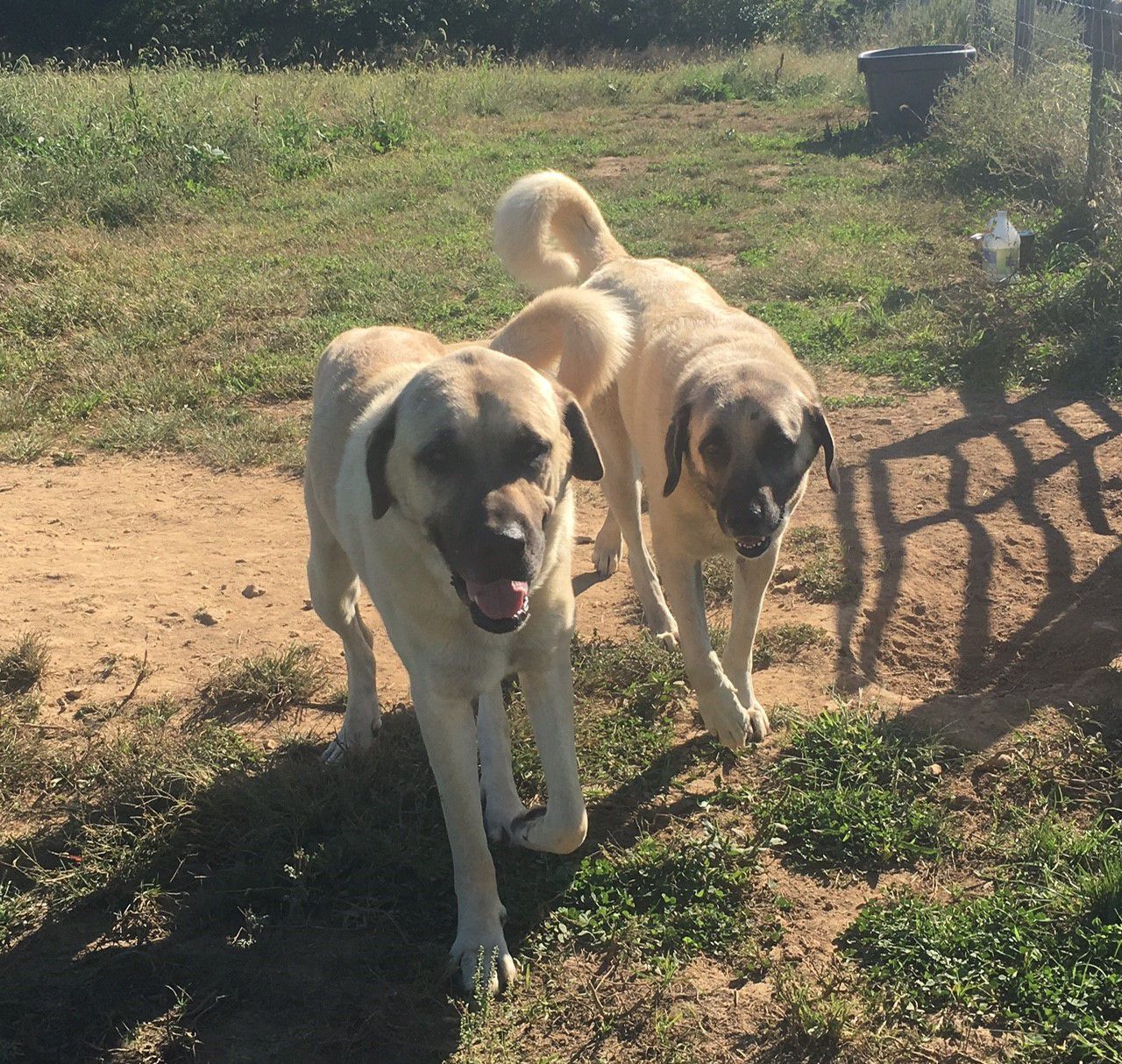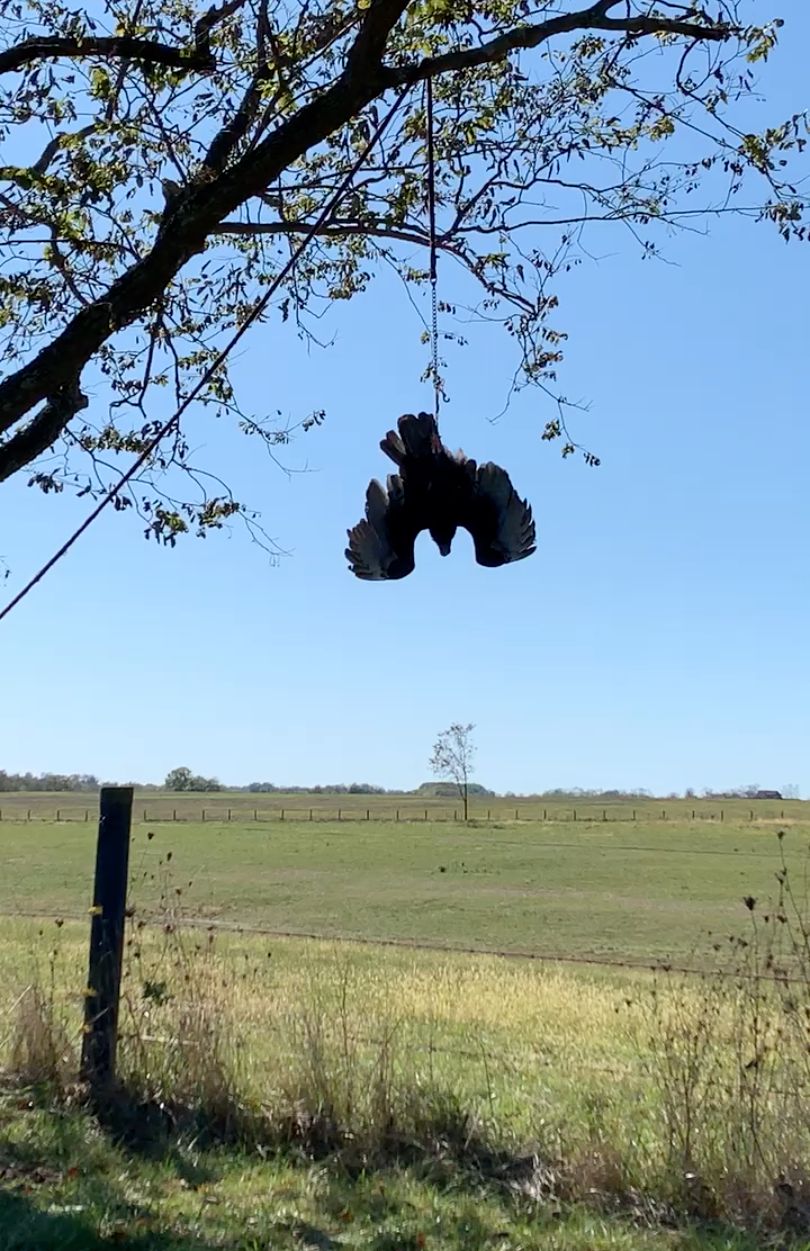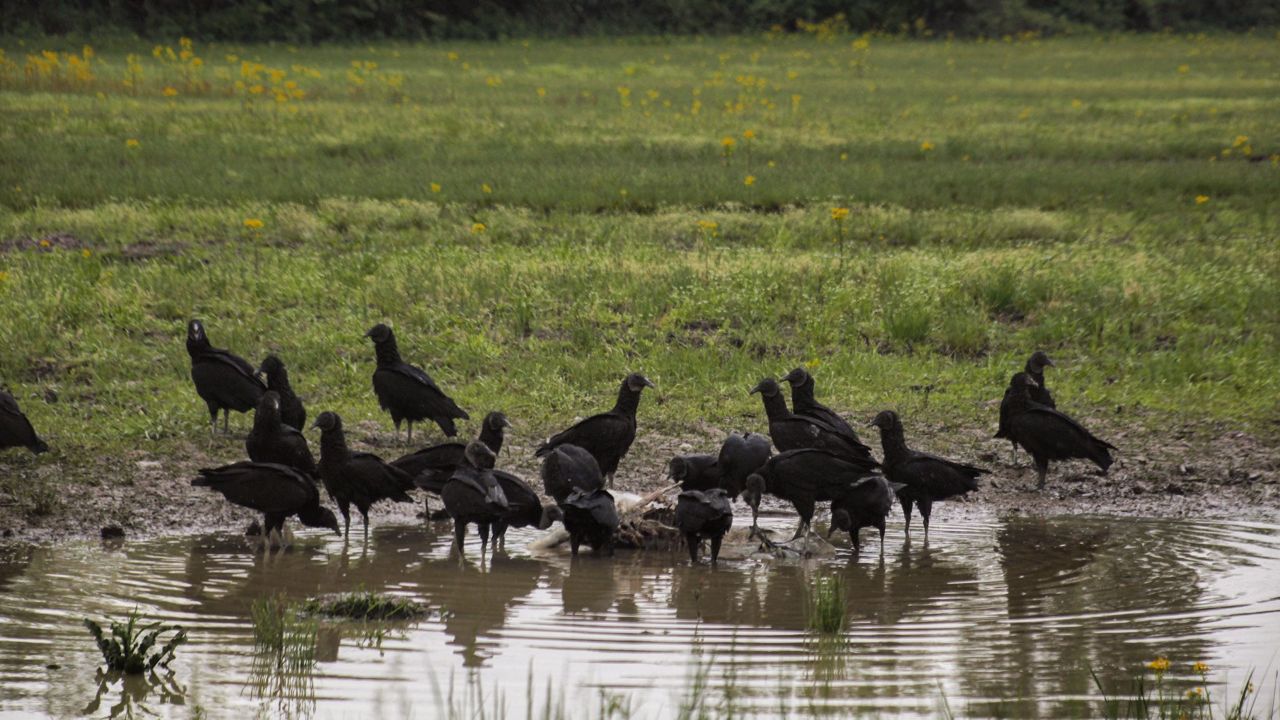LEXINGTON, Ky. — Black vultures are a severe problem for livestock owners in Kentucky.
What You Need To Know
- Black vultures attack, kill several types of livestock
- Birds are native to Kentucky
- Migratory Bird Treaty of 1918 restricts killing black vultures
- Universities asking for carcasses to study attack patterns
The predatory birds will devour living newborn calves, full-grown ewes and lambs by pecking them to death—first the eyes, then the tongue, then every last shred of flesh.
Aside from the danger they pose, livestock producers can not eliminate the birds – even though they are not near extinction and are growing in population – because they are fully protected under the International Migratory Bird Treaty Act of 1918. Kentucky started a pilot program in 2015 that allowed livestock owners to dispose of a set, small number of black vultures to protect their animals by obtaining a federal permit. Still, producers, such as Cyndi Steele, who raises and sells show goats on her Bourbon County farm, says more legislation is necessary to combat the problem.
“They've got to change all that. This is ridiculous,” Steele said about the federal permit. “I figure the value of the goats I’ve lost was close to $28,000, and that's not counting future productivity. I work for public health, and this has been my second job for 28 years. Those birds put a hurting on me by taking a little more than a third of my herd.”
Steele sells her goats as 4-H and Future Farmers of America (FFA) projects. She said nothing leaves her farm for under $1,000, and when nine are killed and several others maimed by black vultures, the amount of lost dollars adds up quickly.
“It took me a while to figure out what it was doing this,” she said. “Black vultures are very aggressive and very intelligent. I was at work, and something kept telling me I needed to go home. I had been at work an hour and a half and they were already dead on the ground when I got home.”
Steele said her Blue Heelers were not enough to stave off black vulture attacks, and the dogs were also being targeted.
“I didn’t even realize the vultures had nicked my alpha male’s face until his head blew up like a basketball,” she said. “I had six Heelers, and they couldn’t keep the birds away. Still, every time I come home, I’m looking for goats with their feet up.”
The U.S. Fish and Wildlife Service program offers permits for killing black vultures, with Kentucky being allocated 350 takes for a total of five per permit issued. The number of permitted kills was later amended to three to accommodate the high number of permit requests. Since then, the number of takes allowed in Kentucky has increased to 1,500 total. Steele said she applied for the federal permit but was met with some resistance and was told by the U.S. Fish and Wildlife representative in Atlanta to stay home to protect her livestock.
“I can’t stay out in my field around the clock,” she said. “I told them I’d do what everyone else does, which is shoot, shovel and shut up. They told me I’d be breaking the law if I did that, and I told them they were forcing me to be a law-breaking citizen. I’m a law-abiding citizen, but with those restrictions, how am I supposed to protect my herd? The laws are creating the issue, and how am I supposed just to sit back and let this happen?”
Steele said she did put her goats in her barn, but that was a temporary solution, as they began giving birth and created the need for more room.
Lexington-area Realtor Kassie Bennett and her husband own a farm in Harrison County outside Cynthiana. She said black vultures have also preyed on her livestock.
“We have a little over 100 head of cattle, and thankfully we haven’t lost any to the black vultures,” she said. “But, they got one of our lambs and did horrible, horrible damage.”
Kentucky Farm Bureau Commodity Division Director Joe Cain said some things could happen that would be beneficial to producers battling black vulture invasions, with one being legislation that creates a safe harbor allowing them to protect their livestock without a permit.
“Since a treaty protects them, it's not just something Congress can go in and set aside,” he said. “The treaty was originally between Canada, Mexico and the United States. Then Russia got involved, and I think China and Japan have signed on now. Black vultures were put on it because they were being hunted for their feathers and were almost hunted to extinction. To change a treaty, you have to open it up, and every signatory country has to agree – just like opening up a law. Anytime you open it up, there are all kinds of little things that can be tinkered with that aren't good. The first challenge is getting every country to agree to it, and the second one is making sure nothing bad is going to come out of opening it. I don't think you'll ever get the treaty opened to where you'd have them taken off the treaty. That's one of the options that could happen, but it's very unlikely.”
Another, and the more likely option, would be Congress authorizing Fish and Wildlife to offer a safe harbor provision for migratory birds to allow eradication without a permit, which Cain said the Kentucky Farm Bureau has been recommending for the past couple of years.
A third option is Fish and Wildlife granting a state-by-state depredation order that would provide a safe harbor for producers seeing damage to their livestock, allowing them to kill a bird that's making the attacks. Still, they would have to report the kill or be in danger of prosecution.
“Reporting them would give them a safe harbor,” Cain said. “We've tried to get Congress to do something, but the biggest problem with that is there are probably only a dozen states that have black vultures, and they're mostly in the southeast. They are starting to get into Indiana, and I've heard there are some even as far north as Iowa.”
Black vultures have multiplied in numbers nationally over the past two decades, and each year, Kentucky farmers lose more than $500,000 worth of livestock to these native vultures, Cain said.
Steele and Lexington farmer Marc Guilfoil, the Evans Mill Cattle Company owner, are using the same method to fend off black vultures and protect their livestock: dogs.

“People can’t be with their livestock; in my case, it’s cattle, 24/7,” Guilfoil said. “An unlimited permit is still no good because, again, you can't be with your cows 24/7, but there are ways to live with black vultures, and we do it on our farm.”
Guilfoil uses several Sivas Kangal shepherd dogs, a breed from Turkey, which he also sells, to naturally take care of the black vultures.
“Farmers around us have lost calves, but we haven't lost a calf in five years,” Guilfoil said. “It doesn’t take long to lose them. Black vultures are a problem. They are a huge problem, but we found a way to take care of it, at least in our little world. Getting dogs or losing livestock are both going to cost you money. Getting the dogs is worth it to go to sleep at night knowing that you're safe from coyotes, black vultures and anything else that might come along.”
Steele bought two Anatolian Kangals to protect her goats. She said the stress of the black vultures has not diminished, but so far, the dogs have worked.
“They're big dogs, and they wintered in the barn with the goats,” she said. “They're doing their job, and they’re pretty interesting to watch. I didn't want big guardian dogs, but these dogs are bred to work hundreds of acres. I graze a 10-acre field, so it's like their backyard.”
Cain said aside from dogs, alpacas, donkeys and other companion animals are also efficient at protecting livestock from black vultures, as are artificial effigies.
“It works better when you use an actual dead bird, but you can use artificial effigies that are shaped like a dead vulture and hang them in an area where the vultures are, and it tends to work,” he said. “But if you have a dead vulture, if you get the permit, you kill a bird, and you hang it up in a tree about 10 feet off the ground in the area where your livestock is, the vultures tend to avoid that area, so the effigies do work. Probably 90% of the people who report that they put up a real bird or an effigy say the birds stay away as long as either is hanging in the tree.”

The University of Kentucky College of Agriculture, Food and Environment has teamed with Purdue University, the U.S. Department of Agriculture Wildlife Services and the Denis H. Heeke Animal Disease Diagnostic Laboratory in southern Indiana to study the problem of black vultures.
UK assistant professor of wildlife management Matthew Springer said researchers are requesting producers donate calves or other livestock to the research effort if they believe the animal was lost to black vultures.
“The goal of this project is to determine the characteristics of an animal killed by a black vulture versus one that is just scavenged upon,” Springer said. “This research should help inform any indemnity loss applications through the USDA Farm Service Agency.”
Springer said the group is prioritizing animals that producers saw being attacked. Someone from UK will pick up the animals and take them to the Heeke lab for examination of injuries and necropsy. Researchers will catalog the results to determine the features of a vulture attack.
“Given the extensive nature of the necropsy, the carcasses need to be in good shape and preferably found within 24 hours of the attack,” Springer said.
Researchers are also seeking black vulture nest sites throughout Kentucky as part of a more significant black vulture research effort in the southeast United States. The larger project is a collaboration with the Murray State University Biology Department and USDA Wildlife Services. “Our goal with the larger study is to better understand the nesting behavior and survival of black vulture nests as well as fledgling movement and survival rates,” Springer said. “The research fits into a larger overall push by USDA Wildlife Services to better understand black vulture populations and behaviors.”
Springer said the overall goals of these efforts are to improve understanding of the black vulture and identify future management strategies to help overcome vulture-related damages.
“This project should help us understand the reasons for the increase in black vulture populations and help minimize human-vulture conflicts in the future,” he said. “If you know of a nest site and would be willing to allow us access to monitor it, please contact us.”
The team will monitor nests using trail cameras to observe nesting behavior and any predation events until chicks leave the nest. The team will briefly visit nest sites every 10-14 days to collect the memory card and check the nesting status. They will attach GPS transmitters to a subset of fledglings when they reach the necessary size and age later in the summer.
“We would be especially grateful if you could report nests as soon as you become aware of them, as we are currently within the vulture breeding season,” Springer said.
Cattle producers interested in helping with the projects should email Springer at mattspringer@uky.edu, or call 859-257-8633. They can also reach out to Phil Kavouriaris at Murray State University at msu.blackvultures@murraystate.edu, or call 270-288-6097.



